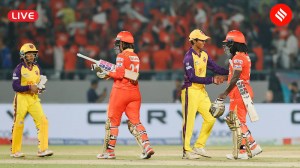Big plan and some small talk
Just a week into his job as India 8217;s football coach, Bob Houghton talks about his big plans of resurrecting the game in the country and also hints at a 8216;small8217; problem. At the pre-season training camp at Goa, the one word that the 58-year-old stresses on is height. He insists that India can climb the ranking ladder and can even qualify for the World Cup. But for starters, he needs a few 8216;six-plus8217; players. In an exclusive interview to MICKY AIGNER, Houghton talks about the 8216;tall order8217; ahead

What are your first thoughts on being the India coach, any specific targets?
The first target obviously is to get the camp completed and to get to know the players and vice versa. It8217;s important that they understand what I expect from them. The Nations Cup 8212; an international series 8212; at Vancouver next month and the 8216;tough8217; Asia Cup qualifier against Saudi Arabia and Japan needs to be addressed from a team that wants to 8216;achieve8217;.
Your philosophy as player and coach.
A coach earns respect by what he does. Firstly, one needs to respect players then show that you are keen and confident to make them successful. Then you need to prove you can win matches with them and make them better players. I suppose, after all that, they will have no problems listening to you.
It seems you have a tough task ahead with star player Bhaichung Bhutia ruling himself out.
First of all every one wants their best players, particularly a goal scorer. I8217;ve never met him Bhutia, I haven8217;t spoken to him or anybody regarding him. He Bhutia may be a diamond of a guy when he is in the camp, making everybody feel good, but give me some time and it will be sorted out.
Would we ever see India play in the World Cup?
Look, in 1998, not many felt China would make it to the World Cup, but four years on, they showed what dedication and dreams could do. Yes, the task is difficult but not impossible, and it will be necessary for India to make a mark in Asia that includes matching Japan and Korea apart from getting through the tough Asian World Cup qualifiers.
Too early to say, but could you share your views on whatever Indian football you8217;ve seen so far?
Enthusiastic and willing to learn, but surprisingly the squad is 8216;small,8217; particularly in a world where several goal-scoring set pieces are dealt with aerially. It brings to mind my stint with China where invariably we always ran into Thailand who were hardworking, quick and technically correct but eventually lost by four goals since they were so small. Among the positives, so far, the players are willing to take anything on board and mind you, it8217;s early season. But I still think we could have picked a few bigger ones. I really believe that.
Could you specify what 8216;small8217; means?
We8217;ve got only two players in the squad who are over 180cm! In the last four years 8212; according to stats 8212; the team has got smaller with the average size of the team coming down from 176 cm to 173, which is strange because most of the teams worldwide go in the other direction. It8217;s a concern. Maybe we should forego quality and just get in a couple of bigger blokes because we need it. Look at England8217;s match against Trinidad and Tobago, the goal scored by Peter Crouch sums up my stand.
Would you call this coaching assignment, your biggest challenge?
FIFA chief Sepp Blatter had reminded me that India would be a 8220;tough assignment8221;. Certain improvements can be made and results will follow. A coach has to be given time and I believe that they coaches do understand that they have to do well or else face the axe. Spending time in China and Uzbekistan where English was hardly spoken was tough, India is much better.
Having coached China and now India, how do you compare both?
One must remember that China are No 5 in Asia and India No 22, so there will be a difference in what they achieve. My feeling is that India is where China was. Maybe China took view of taking a big leap when they failed to qualify for the 1998 World Cup. China, believe me, currently have better facilities than England and clubs regularly run U-8, 10, 12 programmes. China took the 8216;big leap8217; in four years. The question is if this can be achieved in India.
Youth development has been the base of successful teams worldwide. What is your take on that?
Promoting youngsters remains my philosophy. India ought to learn from Japan and Korea as both countries are perfect examples of how soccer superpowers are made. India too needs to concentrate on promoting teenagers in the senior team.
How would you take defeat in your opening fixture?
It is part of any game. However, if we could avoid defeat against Saudi Arabia and Japan it would be a big boost. Going by the status they hold in India and the world, that would be really something.
Will you be working out a particular 8216;style8217; of play?
Absolutely. We will have a definite way of playing. All through my coaching career, I have always adopted the hands-on approach. Between now and going to Vancouver, we will be spending a lion8217;s share of the time working on team tactics.
Your take on fitness and the level you have seen with India.
It is very early to say as the players have just come out from rest. And more so the problem is not always getting fit, but is mostly psychosomatic.
Could you explain yourself?
Look, if you are losing 3-0 the last 15 minutes seems much harder to run than, say, when you are winning by the same margin. Most unsuccessful teams often say they run out of steam after 80 minutes, and the last 10-15 minutes are tiring. It8217;s a psychological thing. In football there are areas: technical skills, tactics and fitness 8212; this covers a definite scientific approach and the physiological aspect. I feel these are areas where we have to make much progress. However, it8217;s the job of the coach to look for that that one positive, like say, a good half-time performance to get the players to deliver their best.
Been around, seen it all
8226; His 30-year-old coaching career has taken him to Europe, Asia, Middle East, North America and Asia
8226; Played for Fulham FC 1966-69 and Brighton 1969-70
8226; Is the youngest ever coach to gain an English FA Full Badge A License
8226; Has authored three books
8226; Led Swede club Malmo to the final of the UEFA Cup in 1979
8226; Coached national teams of China, Kuwait and Uzbekistan
- 01
- 02
- 03
- 04
- 05































